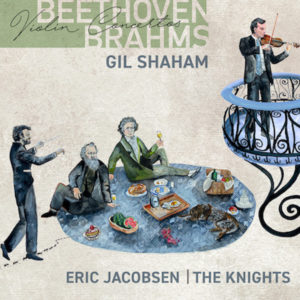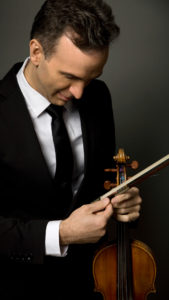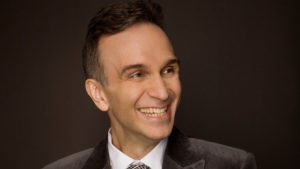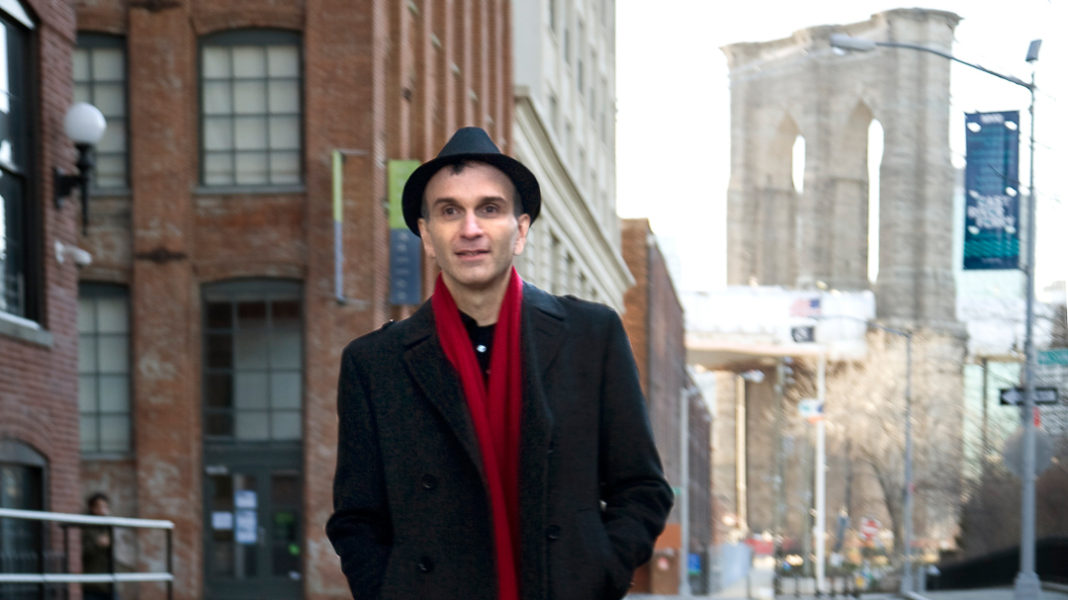It’s suddenly a busy time for Grammy Award-winning classical violinist Gil Shaham. If you need to know why he might be in demand, this is what Patrick Rucker, writing in The Washington Post, said about a concert performance he gave in 2019 with the National Symphony Orchestra:
“Shaham is in the highest echelon of American violinists, and a good deal more musical than many. The sound of his violin is pure, firm, astringent, conveyed with a silvery clarity that shines but never overshadows, and his right arm knows more than one way to color a sound and shape a phrase.”
On February 5th the San Francisco Symphony released a new recording called Alban Berg: Violin Concerto, Seven Early Songs, & Three Pieces for Orchestra featuring Shaham as the soloist for the concerto. This past Sunday Shaham was joined by The Knights for a performance from the 92nd Street Y of Joseph Bologne’s String Quartet No. 5 in G Minor, Op. 1, Beethoven’s Overture to The Creatures of Prometheus and his violin concerto*. Next Friday, he’ll be seen in Los Angeles Chamber Orchestra’s newest Close Quarters film performing Bologne’s Violin Concerto No. 9 in G Major, Op. 8 and Arvo Pärt’s Fratres.

Beethoven’s violin concerto is also the main attraction on Shaham’s newly released Canary Classics recording with The Knights which also features the Brahms violin concerto. For all his many recordings, this marks the first time Shaham has recorded the Beethoven.
Last week I spoke via a Zoom call with Shaham about his passion for Beethoven’s work, the joy he finds in performing and what he’s learned about himself through the pandemic. What follows has been edited for length and clarity.
There’s a YouTube video in which you state about Beethoven’s violin concerto, “If ever there was music that affects the soul and changes lives, this is it.” Are you this passionate about other works or does the Beethoven concerto firmly stand at the front of the line?
It’s definitely at the front of the line. I don’t know that I would say it’s the only such work, but how lucky are we to have that? What a revelation! What a miracle of music! This kind of incredible spinning of the melody and telling of the story is a treasure.
Ten years ago you told the San Diego Union Tribune, “Even when playing the Beethoven Violin Concerto, being a musician is a little like working in the kitchen.” How has your recipe for playing the work changed in the last decade?
You are always kind of tinkering. There’s always something that needs to be done. There’s always some mess to clean up. I guess for me I’m always taking the time to sample so I enjoy it, too. We do it a little bit differently on the recording we’re releasing.
I’ve always played the Fritz Kreisler** cadenzas, but even now we do slightly different linking phrases – like the linking phrases between the 2nd and 3rd movement. I started to do a little improvisation that is loosely based on the piano version of this concerto. Beethoven left us his cadenzas, but only for the piano version. For the violin version he left nothing. Maybe we are a little more adventurous these days adding a little more ornamentation and variety.

I’ve seen you perform multiple times, mostly with the Los Angeles Philharmonic. You perform with more effusive joy than anyone I’ve seen. Where does that joy come from and why is it important for you to express that joy in performance?
I have to say I do enjoy it. And I do try to enjoy it. What a privilege to be on stage with such accomplished masters of music and to be playing the most sublime, timeless masterpieces. It really is a great joy. If it weren’t, maybe I’d be missing something.
You’ve been playing some of Bologne’s work recently. How did this come about?
I guess Adele (Anthony, his wife, also a violinist) had played the quartet I’ll do at 92nd Street Y. I love it. It’s beautiful music. It’s very much from the time of Mozart, from that aesthetic. It’s, to my mind, reminiscent of those two-movement sonatas I grew up studying of Mozart.
The violin concerto we did at LACO was a request. It was a new piece to me. I couldn’t have been happier to learn it. As long as we’re locked up and I’m quarantined in my practice room, it was so nice to spend time with this music. It’s brilliant. It’s extremely violin-y. It makes the instrument sing.
My understanding is that this is filmed from within the orchestra as opposed to being outside of it. How was that process and how do you feel about new approaches to presenting classical music?
Those guys are brilliant. I saw the videographer and the camera operators and the things they were doing I thought were beautiful. They were extremely discreet.
This is a tragic time. People have lost loved ones. People have lost a lot. But ironically it did produce some positives. Many people started thinking out of the box and doing new things. Even the experience of doing this streaming thing. I’ve done concerts with an audience, this is quite different. It’s just you in an empty hall and you’re sharing it with someone who could be anywhere. You’re creating moments but you’re not in the same room.
I always say to my kids you should try new things. Don’t be afraid if it doesn’t work. If it doesn’t, then you learn something. Then I thought, how often do I do that? How often do we go out and risk failure by trying new things?

A couple weeks ago you completed 50 revolutions around the sun. How has the pandemic, combined with this milestone birthday, impacted the way you look forward to the next 25-30 years of your life and career and what you want from them?
This gave us a chance to slow down and examine ourselves. Who are we? What do we want to be? Who do we want to help? So somewhere there was this opportunity.
Suddenly we’re left realizing that it’s really our shared humanity that’s maybe what’s most important.
I remember doing a concert in September in France. They were open – they had just reopened. They closed very quickly after. They had an orchestra and an audience and everybody was very moved, almost in tears. We’re sharing this moment with hundreds of other people. Suddenly we’re not taking anything for granted anymore.
Just now when you were saying about 50 revolutions around the sun, I remember hearing a great conductor, maybe I shouldn’t say who. He turned 75 and he said, “I’m 75 now. So I’m just going to do what I want. Now I’ll do whatever I want.” I think there’s something about that, it’s true. It takes a little bit of courage. Actually what I want to do is this.
It’s a lot easier to be true to yourself – if that’s a value – when it’s your choice, your responsibility. I feel like I am very lucky to be where I am.
*The 92nd Street Y concert will remain available for streaming for several more days. Tickets are $20.
**Fritz Kreisler is considered one of the greatest violinists in the history of classical music. He was also a composer.
Photo: Gil Shaham (©Luke Ratray)












[…] Cultural Attaché Interview: Violinist Gil Shaham and his Joy in Playing Beethoven […]